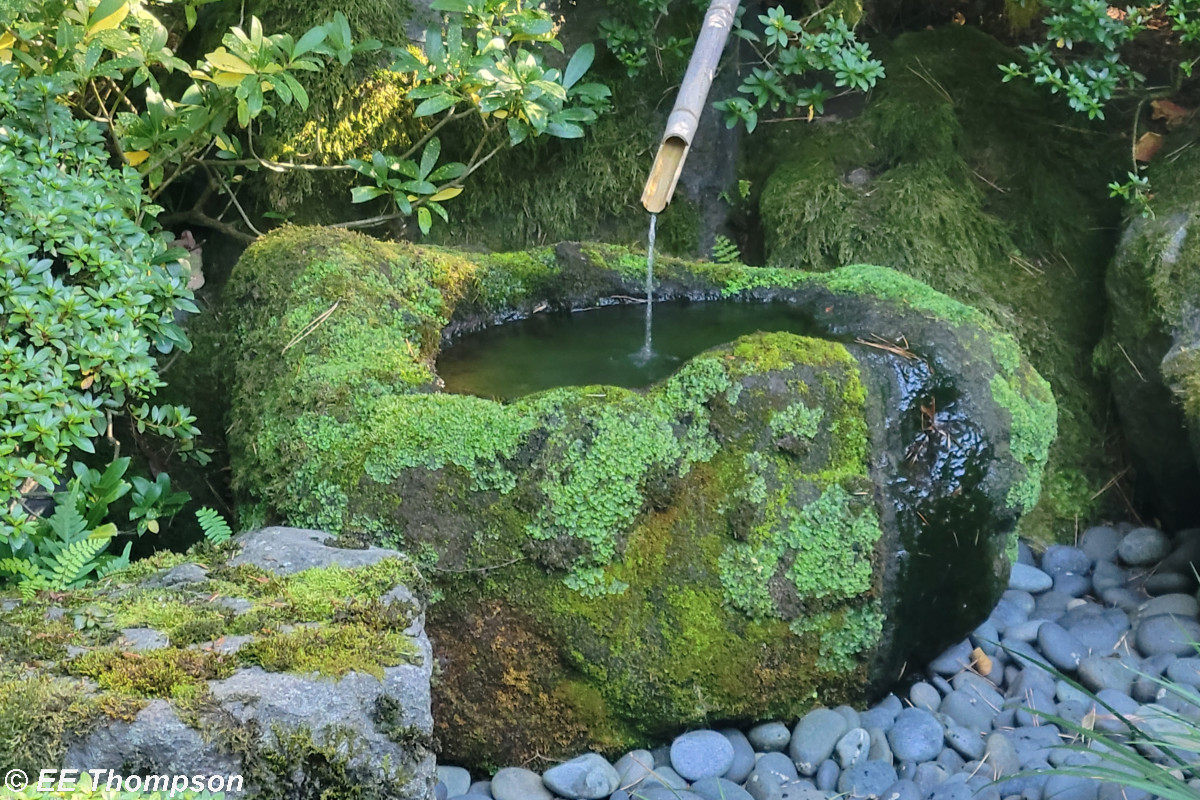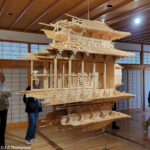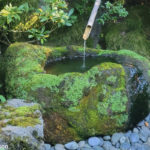A few weeks ago though, Sensei told us the story of “No Water, No Moon” in a dharma talk about women in Zen. The story stuck with me because of the beautiful image of the moon reflected in the bottom of a pail. Yesterday in dokusan1 Sensei used a metaphor about filling a bucket; it wasn’t related to the story. As I was settling back into sitting the my mind followed the bucket and fished out “No Water, No Moon” from my memory. Minds do these kinds of things to try to be helpful during zazen. Suddenly the bucket unfolded into an understanding of not chasing insights, and then further into not trying to fix any of life’s leaky buckets.
As a Sōtō student, I haven’t been taught koan contemplation. Sōtō teachers regard koans as useful for shifting perception, but they tend to use them in talks or as points of discussion. As a result, I didn’t expect anything when the story came up in my mind. I didn’t even know it was a koan. There are a lot of old parables and stories in Buddhism that sound like they could be koans but aren’t. When I looked up “No Water, No Moon” I learned it actually is a formally recognized koan. It’s #29 from the Shasekishū, the Collection of Stone and Sand.
No Water, No Moon
When the nun Chiyono studied Zen under Bukko of Engaku she was unable to attain the fruits of meditation for a long time.
At last one moonlit night she was carrying water in an old pail bound with bamboo. The bamboo broke and the bottom fell out of the pail, and at that moment Chiyono was set free!
In commemoration, she wrote a poem:
In this way and that I tried to save the old pail
Since the bamboo strip was weakening and about to break
Until at last the bottom fell out.
No more water in the pail!
No more moon in the water!
— Paul Reps’ translation
Chasing dharma
Lately I’ve been trying to get my head around the paradox of practicing Zen but not aiming for anything. Unfortunately, I spent a fair amount of time in a problematic enlightenment-focused group. Treating nirvana as an end-game prize is all too common among Western adaptations of Buddhism. Our teacher told us it would take hard work to become enlightened so I was used to putting a lot of mental effort into practice.
When I got a glimpse of the emptiness of sitting zazen, I got excited. It’s always a bit of a gamble taking up a completely new form of Buddhism, and I took the insight as a positive development. The sudden absence of worry about whether I was sitting “right” was tremendously freeing. Alas, when it faded I wanted the sense of freedom back. I’ve had enough training to recognize my folly, but some degree of attachment to insights is almost unavoidable. I increased my efforts. I sat more, read more, and I tried to be more consistent with mindfulness. Nothing happened. Certainly if I just recreated the same train of thought right after the bell in the second sit on a Wednesday night I’d see it again, right? Joko Beck tells a story of suddenly experiencing emptiness at a stoplight and hoping for lights to turn red for the next few months. As she said and I learned, it doesn’t work that way at all.
In my reading though, I found Loch Kelly’s Way of Effortless Mindfulness. I have had a series of small insights using his mindful glimpses but they happen at unexpected times, not on the cushion. Insights have popped into my head while I’m washing dishes, folding clothes, driving, or weirdest of all falling asleep. I am gradually starting to realize that I have no control over when, where, why, or how my mind suddenly grasps some small principle of Zen. I also have no control over how insights last, though I do generally retain some of the understanding.
The leaky pail
My mind had zeroed in on Chiyono’s old pail from the koan. My mental image was of an old oaken bucket with dried out staves though. The staves were irregular with space between them, held together with twisted, rusty old wire. There was no way it would ever hold water and fixing it seemed intensely important. All of a sudden it dawned on me that trying to make the hopelessly leaky bucket into a vessel for dharma was trying to effortfully have insight. The bucket suddenly collapsed inward on itself with almost a tactile sensation of movement in my mind. My understanding had jumped from words to intuition.
Chiyono’s pail had been unnecessary, and the image of the moon was a distraction. She was only able to see the real moon when the image was lost and she looked up from her pail. I am like her, putting tremendous effort into my old, dry bucket. However, putting effort and worry into fixing the broken bucket… making a moment of understanding dharma happen… it’s impossible. It just leads to dukkha about both the dharma and insight.
As the wave of understanding expanded, I realized the broken bucket was exactly that (it was absolute). Nothing on heaven or earth could or should put the bucket back together. That would be to change its nature, which is impossible. Another expansion and the bucket became a metaphor for failing to see the real nature of all the other things I futilely fret over and try to fix in my life. I fail over and over to see that I put effort and worry into things that are out of my control, or that I don’t actually need. Buckets, buckets, leaky buckets everywhere!
A brief aside
I’ll note for any Rinzai practitioners landing here that I didn’t fully “solve” the koan. The moon in water is a metaphor for enlightenment from Dōgen’s Genjokoan. Chiyono was holding onto a kensho experience and could only awaken when that, too was released. My mental bucket was dry and empty so I couldn’t fill it with Chiyono’s moon in the first place. One of the lovely things about koans though, is that any insight gleaned from them is valid. Part of why I didn’t look for a Rinzai Zen teacher is that the notion of “passing” a koan would push me even farther into intellectualizing.
Letting leaky buckets go
The insight confirms my sneaking suspicion that I have absolutely no control over the process of Zen. I can control my actions. I can sit, practice, go to the zendo, give dana, read books, work on my rakasu, and amuse my teacher by babbling excitedly about buckets. However, forcing my leaky bucket into a vessel to capture and hold dharma is utterly impossible. I’m reminded of Sawaki Roshi famously saying “Zazen is good for nothing.” Zazen or any other aspect of Zen is absolutely no good for producing insight on demand. Insights will come as they may, and stay for as short or long as they do. All practice does is cultivate the mind to lighten its firm grasp on expectations. Once the mind is free of expectations and idly playing with a koan, then perhaps an insight will pop in and visit for a while.
The broader letting go in everyday life is even more important, though harder to execute. I put so much effort into worrying about tasks I should just ignore, fixing or storing useless items, or reconciling past disagreements with the notion that they will “fix” my life and somehow make it better. I’ll be looking at my efforts now and asking myself “is that just a leaky bucket?” Maybe sometimes I’ll even see the right answer and leave some of those darned buckets to collapse inward on themselves.
- A private conversation about practice with a Zen teacher ↩︎





